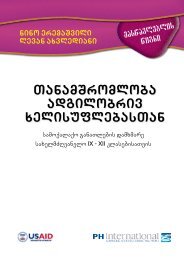The Geneva Protocol, by David Hunter Miller
The Geneva Protocol, by David Hunter Miller
The Geneva Protocol, by David Hunter Miller
You also want an ePaper? Increase the reach of your titles
YUMPU automatically turns print PDFs into web optimized ePapers that Google loves.
CHAPTER XV. 58<br />
CHAPTER XV.<br />
THE PROTOCOL AS TO NON-SIGNATORIES.<br />
At the beginning of this discussion[1] it was pointed out that upon the coming into force of the <strong>Protocol</strong>, there<br />
would, in theory at least, and from the point of view of its provisions, be three classes of Powers in the world,<br />
to wit, the parties to the <strong>Protocol</strong>, the Members of the League not parties to the <strong>Protocol</strong> and the non-Members<br />
of the League, the last named of course being also not parties to the <strong>Protocol</strong>.<br />
It should also be mentioned again that the possibility of this second class of States, namely, the Members of<br />
the League not parties to the <strong>Protocol</strong>, is a temporary possibility only. For certainly if the <strong>Protocol</strong> comes<br />
finally into force, its provisions will in due course be embodied in the Covenant, as indeed is contemplated <strong>by</strong><br />
Article 1 of the <strong>Protocol</strong>; and thereupon those Members of the League who have not ratified the <strong>Protocol</strong> will<br />
either become parties to the amended Covenant or will, under the provisions of Article 26 of the Covenant,<br />
cease to be Members of the League.<br />
However, temporarily, there will doubtless be certain Members of the League of Nations who do not ratify the<br />
<strong>Protocol</strong> and the relation of these States to others during this provisional period is to be considered.<br />
So far as concerns the relations inter se of this temporary or provisional class of States (those which remain<br />
Members of the League without ratifying the <strong>Protocol</strong>) it may be said at once that these relations, from this<br />
point of view, will continue to be governed <strong>by</strong> the Covenant and <strong>by</strong> the Covenant alone. <strong>The</strong> <strong>Protocol</strong> does<br />
not make or purport to make any change in this regard; so that, as among those States, we might envisage<br />
during this temporary period the theoretic possibility of a war not forbidden <strong>by</strong> the Covenant, just as we might<br />
envisage the possibility, during that period, of a dispute among those Powers remaining {87} unsettled. It is, I<br />
suppose, fair to add that both of these speculations are here of juristic interest only.<br />
Similarly, the relations of non-Members of the League inter se will continue, as they are now, to be governed<br />
neither <strong>by</strong> the Covenant nor <strong>by</strong> the <strong>Protocol</strong>. <strong>The</strong>se States would not have bound themselves <strong>by</strong> either<br />
document and so far as concerns their relations with each other, neither the Covenant nor the protocol<br />
attempts to regulate them.<br />
<strong>The</strong> only provision of either document which has any bearing in this regard is to be found in Article 17 of the<br />
Covenant, which says in substance that in case of a dispute between States not Members of the League, such<br />
non-Members shall be invited to become ad hoc members upon conditions laid down <strong>by</strong> the Council. If they<br />
refuse, the Council, under the last paragraph of Article 17 of the Covenant, may take measures toward the<br />
prevention of hostilities; but these measures would be in the nature of good offices or mediation only and<br />
could be accepted or rejected <strong>by</strong> the two non-Members of the League as they saw fit; they could decline them<br />
wholly and go to war at their pleasure.<br />
<strong>The</strong>re is indeed one question which suggests itself to the mind under Article 17 of the Covenant concerning a<br />
dispute between two non-Members of the League. Suppose they should be both invited for the purpose of<br />
settling the dispute to become members ad hoc, and one of them accepted the invitation and the other refused,<br />
would the dispute then be considered as being a dispute between a Member and a non-Member? <strong>The</strong> real<br />
answer to this question probably is that on issuing the invitation the Council would make it a condition that<br />
both parties to the dispute should accept it. <strong>The</strong> legal answer as to the possibility of the case supposed is a<br />
matter of some doubt. I incline to the view that the invitation contemplated <strong>by</strong> Article 17 of the Covenant in a<br />
case when the dispute is between two non-Members, is a joint invitation and a joint invitation only. I do not<br />
think that it is intended that a non-Member of the League may temporarily seek the protection and guarantees<br />
of the Covenant against another non-Member.<br />
{88}
















